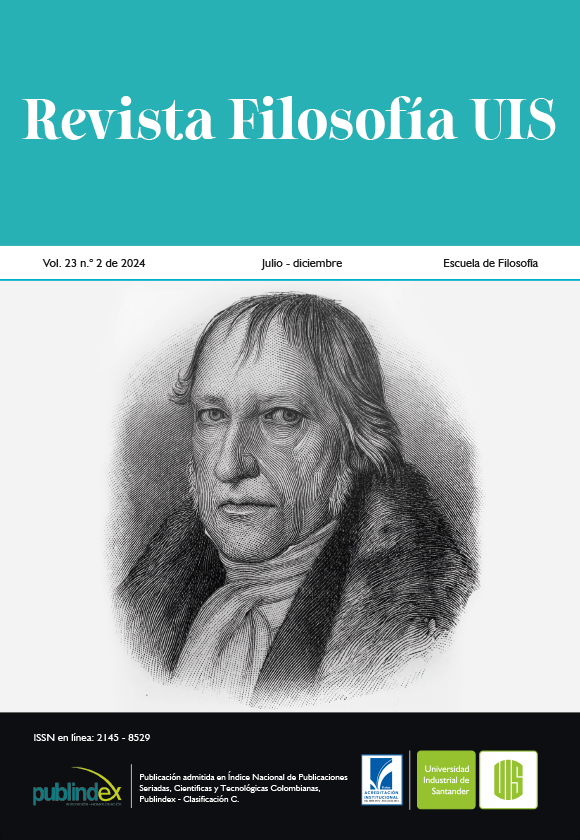Published 2024-07-22
Keywords
- chronic loneliness,
- body feelings,
- traumatic events,
- self-concept,
- emotions
- communication,
- psychology,
- social isolation,
- philosophy medical,
- qualitative research ...More
How to Cite
Copyright (c) 2024 Revista Filosofía UIS

This work is licensed under a Creative Commons Attribution 4.0 International License.
Abstract
a solidão tem sido descrita na literatura filosófica recente como uma emoção que envolve uma atitude de aprovação em relação a certos bens sociais, como companhia ou intimidade, juntamente com a consciência de sua temporária ou permanente inacessibilidade. Tal caracterização revela que a solidão é uma emoção essencialmente ligada à interação social, uma reação dolorosa à ausência de bens sociais. Neste artigo, buscamos demonstrar a existência de uma forma de solidão que pode ser chamada de solidão crônica. A solidão crônica não envolve centralmente a falta de envolvimento social, tal como tem sido usualmente defendido. Tal forma de solidão tem como atributos fundamentais uma dolorosa experiência intrapessoal de autoabsorção e uma sensação de distanciamento e não-pertencimento ao mundo. Tal forma de solidão pode ser descrita não como uma emoção, mas como uma atmosfera afetiva —uma forma afetiva psicopatológica abrangente e de profundo significado moral em virtude do sofrimento emocional e existencial que provoca em seus portadores. Nesse artigo, oferecemos uma caracterização da estrutura da experiência corporal e da experiência de si na solidão crônica. Procuramos mostrar que, como uma atmosfera afetiva abrangente, a solidão crônica afeta nossa inserção corporificada no mundo e a experiência de si- o mundo passa a aparecer como distante, não-envolvente e, no domínio do self, a experiência é marcada por autoabsorção. Com ajuda de textos filosóficos, literários e estudos empíricos, argumentamos que essa sensação é vivenciada em contextos de eventos disruptivos, como a pandemia e na síndrome de estresse pós-traumático.
Downloads
References
- Aho, K. (2019). Contexts of Suffering. Rowman & Littlefield.
- Alberti, F. (2019). A biography of loneliness: The history of an emotion. Oxford University Press.
- Brison, S. (2002). Aftermath: violence and the remaking of a self. Princeton University Press.
- Cardozo-Beltrán, A. (2019). Apuntes fenomenológicos sobre el problema del yo y la conciencia en la filosofía de Sartre. Revista Filosofía UIS, 18(1), https://dx.doi.org/10.18273/revfil.v18n1-2019005
- Colombetti, G., e Krueger, J. (2014). Scaffoldings of the affective mind. Philosophical Psychology, 28(8), 1157–1176. https://doi.org/10.1080/09515089.2014.976334
- Colombetti, G., e Ratcliffe, M. (2012). Bodily Feeling in Depersonalization: A Phenomenological Account. Emotion Review, 4(2), 145-150. https://doi.org/10.1177/1754073911430131
- Dagan, Y., e Yager, J. (2019). Addressing Loneliness in Complex PTSD. Journal of Nervous & Mental Disease, 207(6), 433-439. https://doi.org/10.1097/nmd.0000000000000992
- Dahlberg, L. (2021). Loneliness during the COVID-19 pandemic. Aging & Mental Health, 25(7), 1161-1164. https://doi.org/10.1080/13607863.2021.1875195
- Defoe, D. (2007). Robinson Crusoe. Oxford University Press.
- Elias, N. (1985). The loneliness of the Dying. Continuum
- Gallagher, S. (2023). A Critique of Existential Loneliness. Topoi, 42(5), 1165-1173. https://doi.org/10.1007/s11245-023-09896-4
- Kauppinen, A. (2019). The world according to suffering. En D. Bain, M. Brady e J. Corns (Ed.), Philosophy of Suffering: Metaphysics, Value, and Normativity (pp. 19-36). Routledge.
- Keymer, T. (2007). Introduction to Robinson Crusoe. In: D. Defoe. Robinson Crusoe (pp. 7-40). Oxford University press.
- Krueger, J., Osler, L., e Roberts, T. (2023). Loneliness and Absence in Psychopathology. Topoi, 42(5), 1195–1210. https://doi.org/10.1007/s11245-023-09916-3
- Martin, H., Hillman, S., Cross, R., e Anderson, K. (2022). The manifestations and correlates of dissociation amongst looked-after children in middle childhood. European Journal of Trauma & Dissociation, 6(1), 100232. https://doi.org/10.1016/j.ejtd.2021.100232
- Mercer, Greg. (30 May 2018). “Sea, ice, snow ... it’s all changing': Inuit struggle with warming world”. The Guardian. https://www.theguardian.com/world/2018/may/30/canada-inuits-climate-change-impact-global-warming-melting-ice
- Pacheco Acosta, H. L. (2020). Conceptual issues on Kant’s theory of inner experience. Revista Filosofía UIS, 19(2), 113-134. https://doi.org/10.18273/revfil.v19n2-2020007
- Ratcliffe, M. (2005). The feeling of being. Journal of Consciousness Studies; 12 (8-10), 43-60. https://philpapers.org/rec/RATTFO
- Ratcliffe, M. (2008). Feelings of Being. Phenomenology, psychiatry and the sense of reality. Oxford University Press.
- Ratcliffe, M. (2010) Depression, Guilt and Emotional Depth. Inquiry, 53(6), 602–626,
- Ratcliffe, M. (2012). The Phenomenology of Existential Feeling. Feelings of Being Alive, 23–54. https://doi.org/10.1515/9783110246599.23
- Ratcliffe, M. (2022). Loneliness, Grief, and the Lack of Belonging. In L. Dolezal, e D. Petherbridge (Eds.), Phenomenology of Belonging. SUNY Press. https://www.lonelinessphilpsych.org/uploads/1/3/5/7/135752353/loneliness_and_grief.pdf
- Ratcliffe, M. (2023). Lonely Places and Lonely People. Topoi, 42(5), 1123–1132. https://doi.org/10.1007/s11245-023-09931-4
- Ratcliffe, Matthew. (2013) What is it to lose hope? Phenomenology and the Cognitive Sciences. 12(4), 597-614
- Roberts, T., e Krueger, J. (2021). Loneliness and the Emotional Experience of Absence. The Southern Journal of Philosophy, 59(2), 185–204. Portico. https://doi.org/10.1111/sjp.12387
- Rojas-Valdés, M. A. (2023). Sobre los conceptos heideggerianos de existencia y estar-en-el-mundo y sus similitudes con algunos conceptos orteguianos y sartreanos. Revista Filosofía UIS, 22(2). https://doi.org/10.18273/revfil.v22n2-2023007
- Slaby, J. (2007). Affective intentionality and the feeling body. Phenomenology and the Cognitive Sciences, 7(4), 429–444. https://doi.org/10.1007/s11097-007-9083-x
- Slaby, J., e Stephan, A. (2008). Affective intentionality and self-consciousness. Consciousness and Cognition, 17(2), 506–513. https://doi.org/10.1016/j.concog.2008.03.007
- Willett, C. (2004). The social element: A phenomenology of racialized space and the limits of liberalism. In: M. Levine, T. Pataki (Eds.). Racism in Mind. Cornell University Press.

